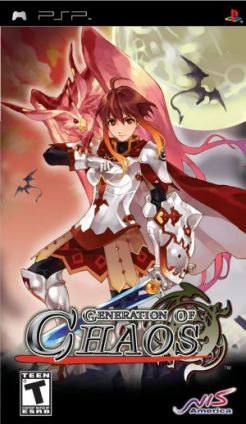Generation of Chaos
Generation of Chaos is a turn based strategy role playing game that was released in early 2006 for the Sony Playstation Portable.
| Developer: Idea Factory Publisher: NIS America Release Date: February 28, 2006 Platforms: PSP JustRPG Score: 67% Pros: +Interesting kingdom management gameplay. +Good visuals. +Simple strategy combat. Cons: -No replayability -Weak story. |
Generation of Chaos Overview
Generation of Chaos is a turn based strategy role playing game that revolves around managing a kingdom and controlling an army. The kingdom management aspect of the game is very unique and keeps the player excited and interesting. The combat aspect of the game works very much like rock paper scissors. Certain unit types can easily defeat others while some completely dominate. The looks alright for psp but suffers from a few issues. One issue is that the combat gets very repetitive and another is that the story is extremely weak.
Generation of Chaos Screenshots
Generation of Chaos Featured Video
Generation of Chaos Review
By: Jason Ferguson
| Generation of Chaos is a real-time strategy RPG developed by Idea Factory, and the first title to be published by NIS America for the PSP. Released in late February of 2006, Generation of Chaos is a very unique strategy-RPG that patient hardcore fans of the genre should really enjoy. The only problem is that anyone who is not a fan might have some difficulty getting to the meat of the game. |
|
The story in Generation of Chaos is not exactly one of the game’s high points, and for the most part really isn’t even too important. When the game begins, you start off as the head commander of one of the rival Kingdoms in the world of Lost Grounds. Once the first campaign is completed, the others will become unlocked and you will be given more access to the other Kingdoms. Like I said earlier, the main attraction of the game won’t be focused on the story, but instead on the game’s combat. Well, that is if you can get past the difficulty of understanding how the combat works. |
| Easily one of the worst and most frustrating things about the game is the difficult learning curve. Realistically, the learning curve might not be so high if it weren’t for the fact that the game doesn’t have any sort of tutorial. Even though I normally become somewhat irritated with basic game tutorials, Generation of Chaos is easily one of those games that absolutely needs a tutorial. The combat features a large amount of menus, each of which are all abbreviated, making it even more difficult to comprehend what exactly you are supposed to be doing. During the campaign for beginners, where you would assume a tutorial would be, one of the characters mentions that he will teach you the basics of the game, yet afterwards he doesn’t. Chances are the difficulty in comprehending the game will easily turn away many gamers, and those who decide to stick with the game will spend several hours figuring it out. Luckily, however, NIS America has recently released an online guide that can be viewed at their site, with a full walkthrough and strategies to help along the way. |
| Aside from the real-time strategy elements, Generation of Chaos is also quite similar to a turn-based RPG. When a campaign begins, you will be taken to a large map filled with a number of squares and some key points, including castles, towns, or caves. Located inside some of the castles will be some of your army’s different commanders. With each turn you will be able to make up to five actions, whether it is move, attack, or recruit more soldiers. Of course, the main objective is to move your characters around the map and take over the enemy locations, but there will also be some other strategy involved. |
|
Some of the strategy of Generation of Chaos not only comes from the actual combat, but which characters are used during different scenarios and times. There are certain types of landscapes where different characters will be more efficient, times of day when certain characters including Vampires will be tougher, and certain types of weather where other characters will be stronger. This adds a little extra strategy to the game, but chances are most individuals will probably just ignore these and use whichever characters they like most. The game also incorporates resource management into the mix, using money to not only recruit more soldiers but created new buildings. Certain types of politics are also available in the game, in which you are able to make alliances with other Kingdoms. While each of these add some depth and uniqueness to the game, the fact that there is no real explanation on how to do much of this can be quite difficult to understand. |
| As for the combat, this is initiated when two opposing commanders are located on the same square. These battles take place in real-time, and can consist of each army battling with twenty-nine soldiers and one commander. Rather then controlling each individual soldier, the player will take the role of the commanding officer, who will give out orders to his army. Even before the battle begins, the commander can issue the formation of their soldiers and whether the army should crush the entire opposing army or instead target only their commanding officer. |
| One of the more useful things about commanders is that each of them comes equipped with different magical spells, combat moves, and special abilities. Combat moves and magic spells can be especially useful in defeating enemy soldiers, but these will deplete an amount of their skill points. The most useful and powerful types of abilities are known as special abilities. To obtain a super ability, you must either sustain an amount of damage, or defeat a number of enemies. Every time you do so your “sup” gauge will start to fill, and once it is completely filled you will obtain a super ability. The only real problem is that performing a super ability will trigger an animated cutscene, which looks really nice, but they occasionally drag out too long and have a tendency to slow down the combat. However, it is possible to shut these off, which might be quite useful. Then again, the whole battle can take quite some time to finish and drag on for far too long. |
|
After successfully defeating an enemy army, sometimes your soldiers will be able to take the rival commander prisoner. Each commander can only bare a few prisoners, so in order to lighten the load you can either choose to execute them, release them, or try and have them join your army. It’s possible to have up to fifty different commanding officers in your army, but actually using that large of an army might be a little difficult, especially since you are only granted five moves a turn. |
| Aside from being able to take prisoners, defeating an enemy army will also give your commander an amount of experience points. Once a character has gained enough experience, they will level up and the player will be able to hand out different points to increase certain stats. Each commander will only be able to level a few times, so those who like to throw all of their eggs in one basket will have their work cut out for them. |
| Concerning the graphics and sound, Generation of Chaos features some fairly well done graphics. The character portraits are well done and many of the sprites look nice, too. And many of the commanding officers’ special abilities and regular abilities are visually appealing. As far as the sound department goes, most of the soundtrack is good, but it occasionally can skip during load times. For the most part the voice work is done well, but some of the voices don’t exactly fit certain characters. |
|
All in all, Generation of Chaos is a rather unique game that is only really recommended to any gamer with a lot of patience. While the game can be fun, and is very unique, the difficulty in truly understanding the game will more than likely turn away most gamers. |
| Final Grade: 67% |
Generation of Chaos Screenshots
Generation of Chaos Videos
Generation of Chaos Trailer















